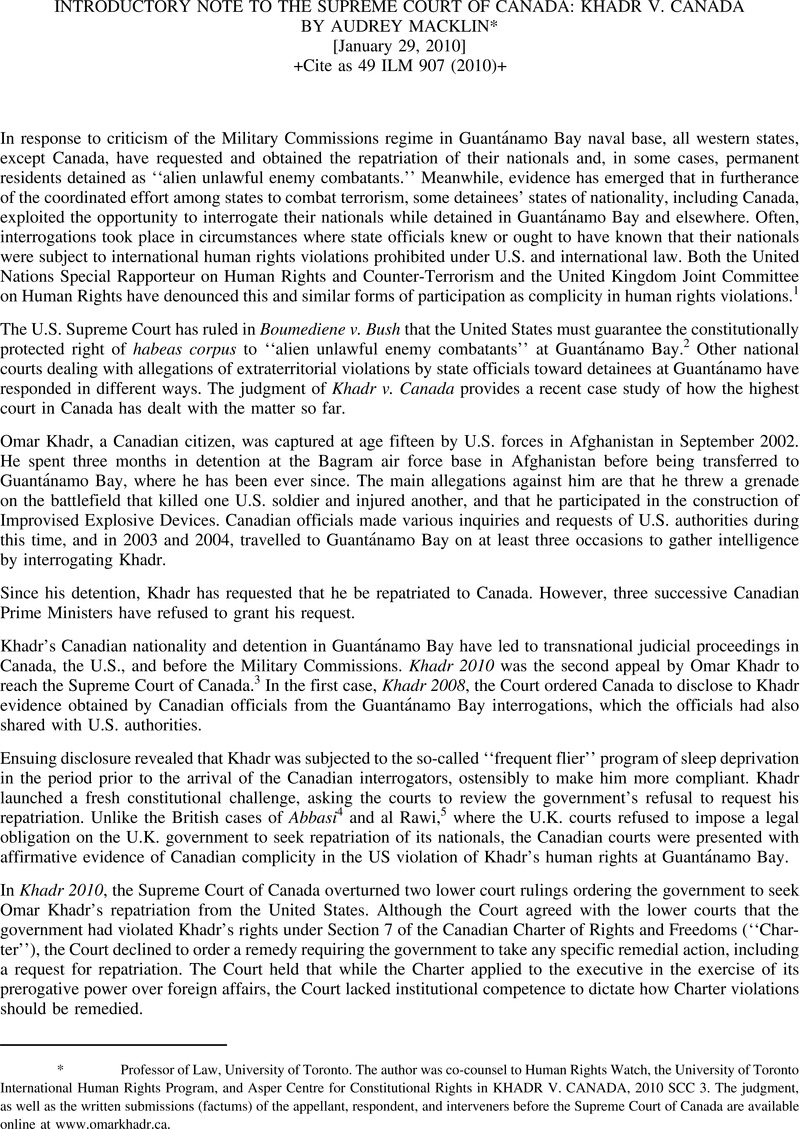Article contents
The Supreme Court of Canada: Khadr v. Canada
Published online by Cambridge University Press: 27 February 2017
Abstract

- Type
- International Legal Documents
- Information
- Copyright
- Copyright © American Society of International Law 2010
References
Endnotes
* This text was reproduced and reformatted from the text available at the Judgments of the Supreme Court of Canada website (visited May 26, 2010) http://csc.lexum.umontreal.ca/en/2010/2010scc3/2010scc3.html.
1 Joint Committee on Human Rights, Allegations of UK Complicity in Torture, Report, 2008-9, H.C.&H.LGoogle Scholar, available at http://www.publications.parliament.uk/pa/jt200809/jtselect/jtrights/152/15202.htm; Special Rapporteur on the Promotion&Prot. of Human Rights&Fundamental Freedoms While Countering Terrorism, U.N. Doc. A/HRC/10/3 (Feb. 4, 2009) (by Martin Scheinin).
2 See Boumediene v. Bush, 128 S. Ct. 2229 (2008).
3 Khadr v. Canada, [2010] S.C.R. 3 (Can.).
4 See Abbasi v. Foreign Secretary, [2002] EWCA (Civ) 1598 (Eng.).
5 See al Rawi v. Security Service, [2010] EWHC (QB) 1496 (Eng.).
6 R. v. Hape, 2007 SCC 26, [2007] 2 S.C.R. 292, ¶ 48 (Can.).
7 Hamdan v. Rumsfeld, No. 05-184 (U.S. June 29, 2006) (concerning the entitlement of Guantánamo detainees to assert the right of habeas corpus under the U.S. Constitution).
8 Id. ¶ 55 (raising a conceptual problem that the Court in Khadr 2010 did not address: if the Charter provides at least the same level as international human rights, and extraterritorial application of the Charter is triggered by conduct of Canadian officials that breach Canada’s international human rights obligations, then proof of Charter application should also prove the Charter violation). In other words, the threshold test for extraterritorial Charter application and the test for an actual breach of a Charter right collapse into one another.
9 International Covenant on Civil and Political Rights art. 2, Dec. 16, 1966, 999 U.N.T.S. 171 [hereinafter ICCPR].
10 Convention on the Rights of the Child art. 2, Nov. 20, 1989, 1577 U.N.T.S. 3 [hereinafter CRC].
11 Convention Against Torture and Other Cruel. Inhuman or Degrading Treatment or Punishment, Dec. 10, 1984, 1465 U.N.T.S. 85.
12 Optional Protocol to the Convention on the Rights of the Child on the Involvement of Children in Armed Conflict, G.A. Res. 54/263, U.N. Doc A/RES/54/263, Annex 1 (May 25, 2000).
13 Khadr v. Canada, supra note 3, ¶ 25. Evidence presented at trial demonstrated that Khadr was held in prolonged, incommunicado detention without charge; he had no access to counsel or other legal support, and Canadian authorities were aware of prior abuse and mistreatment.
14 Notably, however, where the U.K. courts invoked international law in Abbasi and al Rawi to deny a legal duty incumbent on the executive to seek repatriation of citizens and permanent residents detained in Guantanamo Bay, they did not have before them evidence of active U.K. complicity.
15 See ICCPR, supra note 9; and CRC, supra note 10.
16 Ilascu v. Moldova & Russia, App. No. 48787/99, ¶ 317 (Eur. Ct. H.R. 2004), available at http://www.echr.coe.int.
17 Khadr v. Canada (Prime Minister), 2010 FC 715 (Can.).
18 Canada (Prime Minister) v. Khadr, 2010 FCA 199 (Can.).
- 1
- Cited by


